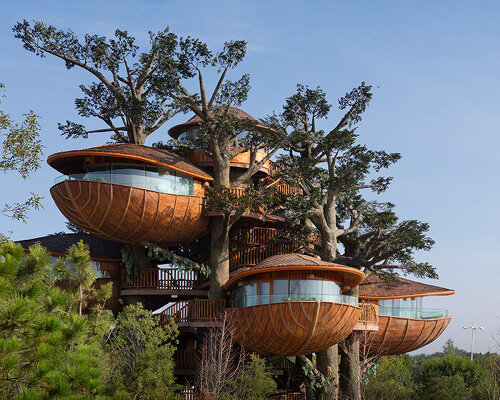doarchiwow redefines prefabricated architecture in china
Doarchiwow’s Forest Nests Treepod Project is a modular ecological dwelling concept conceived as both a resort prototype and a model for near-zero-carbon, low-impact construction. The series reimagines the treehouse typology as a vertical, nature-integrated community adaptable to diverse environments, from coastal zones to urban forests in China’s Rizhao and Wuhan.
The architectural language of Forest Nests draws from bird nests, cocoons, and other biological structures, translating them into a modular system of fluid geometries. Each pod features a steel framework wrapped in wood shingles, weathering steel plates, aluminum panels, and glass. This synthesis allows the prefabricated units to appear as if they have grown organically within the landscape.
all images by © Liang Shan, unless stated otherwise
Forest Nests Treepod organic forms are shaped by modular logic
Digital fabrication and parametric modeling enable the realization of the Forest Nests’s complex, curvilinear volumes. Doarchiwow, a newly established spin-off of DO Architects specializing in high-quality prefabricated building systems, avoids the visual rigidity often associated with modular design through organic outlines that let the architecture blend into the surrounding woodland or shoreline, creating the impression of a living organism within nature’s continuum.
A 270-degree floor-to-ceiling window acts as the central visual frame, drawing natural light and sweeping forest or coastal views deep into the interior. The architects conceal all core technical and service systems within the structural shell to preserve the purity of the exterior form. The pods operate as micro-living units equipped with smart home systems and a digital network.
Doarchiwow’s Forest Nests Treepod Project is a modular ecological dwelling concept
sustainability from eco-friendly to near-zero carbon
Beyond form and experience, the project embodies Doarchiwow’s ambition to move from eco-friendly design toward the more demanding goal of near-zero carbon building. This is achieved through a tripartite strategy combining passive design, active environmental technologies, and microclimate-responsive construction. Lightweight prefabrication minimizes ground disturbance and material waste, while modular assembly reduces on-site labor and energy consumption. Each pod functions as a semi-autonomous environmental system, capable of adapting to various climates and contexts, from dense urban green corridors to sensitive natural reserves.
For Doarchiwow, Forest Nests reflects its broader mission to reshape construction methods and vacation lifestyles alike. Focused on creating immersive environments for boutique resorts, campsites, and rural experiences, the company merges technology, design, and ecological thinking to bring new vitality to the cultural tourism and construction sectors.
a resort prototype and a model for near-zero-carbon, low-impact construction
reimagining the treehouse typology | image by © Wu Wei
a vertical, nature-integrated community adaptable to diverse environments
the architectural language of Forest Nests draws from bird nests, cocoons, and other biological structures
a modular system of fluid geometries | image by © Wu Wei
each pod features a steel framework wrapped in wood shingles
prefabricated units appear as if they have grown organically within the landscape
digital fabrication and parametric modeling enable the realization of curvilinear volumes
a living organism within nature’s continuum
270-degree floor-to-ceiling windows act as central visual frames
modular assembly reduces on-site labor and energy consumption
each pod functions as a semi-autonomous environmental system
capable of adapting to various climates and contexts
project info:
name: Forest Nests Treepod Project
architect: Doarchiwow
location: Rizhao, Shandong / Wuhan, Hubei, China
gross built area: 441.92 sqm
architecture team: Tang Jiajia, Wang Wenrui, Jiang Hong
construction: Miao Jianbo, Chen Tong
interior: Dean Ma
engineer: Yao Yifang, Chen Yong, Guo Nanxing, He Xumeng, Sun Cui, Fan Gong
partner: Vale Theme Art (Theming & Scenic Art)
client: Senbo Tourism
photographers: Liang Shan, Wu Wei
The post modular forest nests by doarchiwow propose model for prefabricated eco-resorts in china appeared first on designboom | architecture & design magazine.

